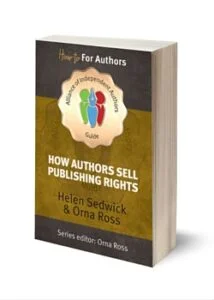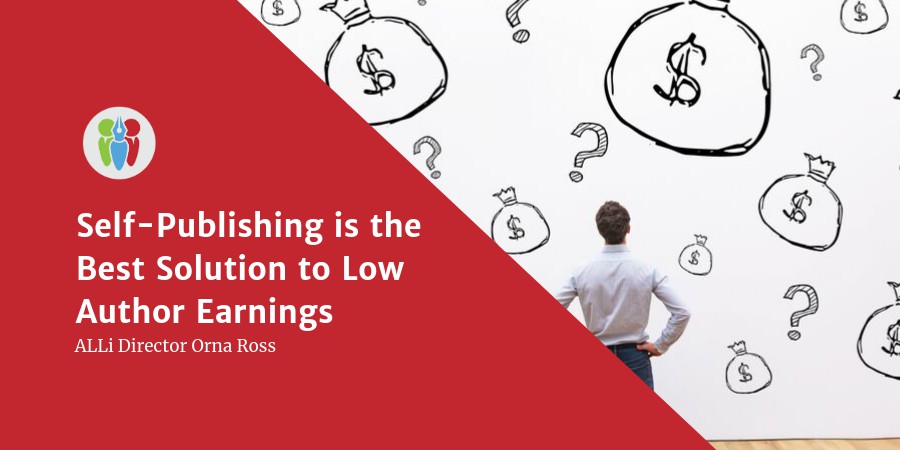Self-Publishing is the best solution to low author earnings and it's time this was more widely recognized in the literary and publishing industries. These days, authorship is a business, not a career says ALLi Director Orna Ross. But the literary, publishing and creative industries are failing to recognize this, and so failing to best support authors who want to make a living from writing.
Best Solution to Low Author Earnings: Follow The Money
There is an old business saying: follow the money to see the true story. If we follow the money in publishing, from the perspective of authors, what story does it tell us?
This is the typical money trail in trade publishing:
- Reader pays bookstore
- Bookstore pays wholesaler
- Wholesaler pays distributor (sometimes wholesaler and distributor are one)
- Distributor pays publisher
- Publisher pays agent
- Agent pays author many months after the sale (who, by the time everyone has had their cut, receives less than 10% of book retail price).
This business model of selling print books through bookstores is not commercially viable for most indie authors. Economies of scale means that few of us can compete with trade publishing in the print-book-to-bookstore model. And the economics of physical bookstore distribution, given the discounts retailers, wholesalers and distributors need to make their profits, are punishing, even for big publishers.
But digital publishing—e-books, audiobooks and POD—tells a different story. Digital delivers a global audience, relatively inexpensive production costs, a point-of purchase at the moment of discovery, the end to “out-of-print”, and a level playing field that any author can access.
In self-publishing the most common money chain looks like this:
- Reader pays online bookstore (the author's website or a retailer such as Amazon, Apple, Google, Kobo etc).
- Author gets paid immediately on own website (full cost of book, minus publishing expenses); or 90 days after transaction (up to 70% of book retail price) through the retailer or one of the aggregators who distribute to them (who will also take a cut).
And these online stores, with their global readership, 24/7, give far more access to readers than any physical store can provide.
Best Solution to Low Author Earnings: Follow The Rights

ALLi's Rights guidebook
Self-Publishing is also advantageous from a rights perspective.
The days of needing to give an exclusive, all-territories, long-term, license to a publisher in order to see our books on sale, disappeared a decade ago.
Indie authors retain ownership of all publishing rights and the savvy author understands the value of that. Owning and creating value from our rights, today's authors can adopt a variety of business models, produce a variety of book-related content, in text, video and audio and distribute it through a variety of outlets and platforms, not least our own websites.
The author who is stuck in a Cinderella complex, where Prince Publisher Charming is going to sweep in, fall in love with their book, and carry them off to fame and fortune, without them having to do the work, has failed to grasp the enormity of what gets handed over in such a transaction.
The most independent indie authors don't put all their publishing eggs into one basket, whether that's a trade publisher or self-publishing service. They understand, and retain, the value of their publishing rights, and license them selectively.

Reader. Picture by Stephane YAICH on Unsplash.
Best Solution to Low Author Earnings: Follow The Readers
What few authors know is that a publisher's business model is built on failure for the majority of authors that they take on. Of every 20 authors who sign with them, probably two will do well enough to make a living from their writing (and pay the overheads of the publisher). The problem is they don't know which two it will be.
They are fired out into the marketplace, to see what sticks. From the publisher's perspective, that's understandable. They know they only need that one or two to do well in order to recoup their investment in all.
The effect for the authors is devastating. They, and their “failed” books are dropped, but they have gained no publishing skills in the transaction. Any confidence they gained from signing the deal in the first place has probably been eroded. And if they seek another publisher they are doing so from a very weak bargaining position.
By contrast, those who self-publish, and combine self-publishing with selective, non-exclusive licensing, are building skills and confidence with each book, each sale, each negotiation, each deal. We are building an author business, step by step, book by book, reader by reader, collaboration by collaboration.
As an author, you may relish the creative challenges of self-publishing, or you may quail at them, but building those skills empowers you.
Self-publishing authors who are poor have not yet learned the skills of writing well and publishing well. Trade-published authors who are poor are writing well enough to attract commercial interest but the system works against them
Author poverty is not only accepted in traditional publishing, it's expected. It's the foundation on which publishing businesses are built, evident everywhere in mindsets, business practices, and contracts.
Poverty for skilled authors is not systemic in self-publishing, as it is in the traditional publishing system.
Best Solution to Low Author Earnings: Follow The Authors
Today, the tools of social media and digital advertising, allow authors to build reader followings that will purchase their work through their own websites, and donate and support their work as patrons.
This is Self-Publishing 3.0: authors building sustainable, profitable and scalable creative businesses.
New technologies like machine learning, translation and other AI, the blockchain, cryptocurrency and other tools are fast coming on track, with the power to further shift economies, businesses and behaviors all over again. But authors who have exclusively licensed all rights are bound by (often needlessly) circumscribed contracts. They cannot avail of any of this opportunity.
In addition, they have no control over their metadata or market positioning. They are powerless. And that's why they are poor.
Becoming a good self-publisher restores this lost creative and commercial power.
It's time the literary and publishing industries, and the ministries responsible for creative business, entrepreneurship, culture, intellectual property and the knowledge economy, recognized self-publishing and creative business skills as the best available answer to author poverty.
An author who has gained self-confidence from publishing–figured out who their readers are and what they want, understood the value they offer, created products and projects that generate money–becomes an unstoppable force. At the start, though, many need support. It can be overwhelming, learning everything you need to know and practice to become a good writer, and then a good publisher.
The literary and publishing industries that are supposed to provide that support are failing to recognize the needs of today's author. It's time to shift. Rather than clinging to a twentieth-century, pre-digital model, publishing and literary policy must be reframed around how author-publishers actually work, trade and negotiate today.
Around how today’s readers actually discover, buy and read books.
As authors, we need to take back our power, stop dreaming of unearned success, and start doing the work of writing and publishing well, getting to understand what our readers want and need from us, and meeting our publishing colleagues as equals.
The literary, publishing and creative industries need to stop wringing their hands about author poverty, while overseeing conservative, even entrenched, policies and practices.
It's time we all got better at identifying, quantifying, talking to, tracking and supporting independent authors as creative, digital, micro-publishing businesses.
Self-Publishing is the Best Solution to Low Author Income say @ornaross #indieauthor #selfpublishing #IARTG #ASMRG #writingcommunity Share on XOVER TO YOU
Do you think the literary industries are failing authors? Do you feel empowered as an indie author?
If you enjoyed this post, you might like these from the ALLi archive:
https://selfpublishingadvice.org/author-earnings-through-author-business/






Thanks for this, Orna! I will forward this to some traditionally-published authors I know who are struggling.
I’ve decided to go the indie publishing route with my first novel, currently climbing the Himalayan learning curve in anticipation of a late-Spring launch. I am just at the point of establishing my book’s price point and (through IngramSpark) its trade discount. My question for you is, how useful is it for a new author on the scene, in a crowded genre (medical thrillers), to try for the bricks-and-mortar bookstores market by offering up the maximum trade discount?
I’m willing to take the bite of a 55% discount if it means wider physical distribution, but not if there’s virtually no chance of chain or independent bookstores stocking a new author. Any thoughts?
I’m late coming to this article–I save so many, and sometimes don’t get back to them in a timely manner. This is a powerful article, making me rethink my recent efforts to get a traditional publishing contract. I published traditionally in the 1980s and 1990s–found myself deep in the throes of traditional-publishing misery. (I tell a little of my story in this post, https://justcanthelpwriting.com/2018/12/17/myths-and-truths-about-traditional-publishing-what-it-was-like-for-me/). I retrieved my rights once I retired and found publishing my books digitally on Amazon and Smashwords quite easy, and creating a print copy not all that hard. I have been thinking that being traditionally published again would enhance my credentials, but then so would becoming a successful indie author. When I think that I could have my new books out there for readers in a matter of days. . . . You’ve really made me think.
Wonderful… helping authors think things through is what we’re here for. Rather than thinking about it dualistically–indie versus trade published–the mindset we encourage is one of selective licensing i.e. self-publishing your titles but licensing print rights or translation rights or other rights selectively to a variety of publishers. You can have different processes and strategies for different books. Do whatever ever works best for particular titles, with an overall holistic perspective of selective licensing?
Nice article, Orna. Immediate income and the potential for long-term wealth based on the exploitation of fully owned rights are definitely the two main ways in which self-publishing empowers writers. There’s also the important factor that you can start (and stay) as small as you like–self-publishing accommodates everyone, from the hobby writer who just wants to publish a book or two to the ambitious brand-builder who dreams of her very own business empire. Both examples are frequently found among self-publishers, although most of us probably fall into the “scrappy entrepreneur” category at first and become more business-oriented as we go on. There are simply no barriers to entry and no limits on what can be achieved.
Especially as it’s getting easier . . . those of us who’ve been in this business for a while have seen a massive development in truly innovative, exciting, efficient author tools and services, particularly in the last three years or so. I just got back from the NINC conference where the level of smarts was mind-blowing and the talk of future developments thrilling. I’m convinced that the print-to-bookstore conundrum is going to crack in the next five years, giving us full access to the browsing buyer and to library print acquisition; audiobooks are about to become as profitable as ebooks for authors; and at some point in the near future we are going to be able to sell ebook, audiobook, and print easily from our own websites.
The inevitability of these developments stems from the massive size of the self-publishing sector, which is becoming a profitable target market for apps and services backed up by large amounts of venture capital. I don’t think most authors outside our industry realize how huge and sophisticated it’s become–they’re still encouraged to think of self-publishing as the weak end of the publishing industry, whereas the reality is that we are possibly stronger as we’re less dependent on annual profits and hierarchical structures. Our very nature makes it less likely that we’ll ever coalesce into the large corporate structures that, as Jeff Bezos has recognized, are ultimately self-destroying.
In short, we’re an industry quite unlike anything that’s come before us (as all of us who have to explain self-publishing to our accountants know). We have the edge over the other creative industries because our product is more flexible, more easily packaged, and more replicable than other forms of creativity. Authors need to know all of these things as well as the financial advantages of being your own creative boss.
Thank you Jane… I completely agree. While we are very strong as a group, individual authors can need quite a bit of support at the beginning, if they are not to fall off. Or indeed, not get on board in the first place because they are still working with an unrealistic model of what’s possible in their minds. Thanks for your thoughtful comment and I agree we need to speak more about power and potential too. That’s the topic of another blog post soon… And we’d love one from you on the topic too?
Thanks, Orna. Good advice.
Late in my self-publishing process, I was invited by a publisher to submit a proposal. We had a detailed discussion about it but it didn’t fly. The Only thing they could offer is more exposure in certain markets. But I’d lose much of what you described.
You mention having a web site. it’s useful to point out this is central to a self-published author. This should be the hub of your marketing and social media. I don’t recommend Facebook for that role because it’s a closed system and not everyone is on it. But it is a good platform for getting the word out. I do recommend WordPress. it’s blog based, ideal for writers to post samples, announcements, and develop a readership. It’s also modular so you can add features, like a plugin to feed your posts automatically to Twitter, Facebook, and so on.
Amazon is the largest bookstore, so you do want your book there. But I’ve also used Ingram. They distribute to a number of other outlets, both online like B&N and Chapters, but also they’re a major distributor to bookstores. That way, people can order your book in their favorite store or library.
Of course, this means a print version. Thats a little more involved than an ebook but can be very worth it for some markets. My book, for example, is non-fiction. I’ve had more print sales than ebook.
And finally, while you can just write something up in Word and post it on Kindle, you are competing with professionally produced works. Your work will be dismissed if it doesn’t mean pro standards like a nice cover, TOC, and so forth.
There is lots of online content to support authors through each step of the process. But be wary of “vanity presses” that you pay to help you self-publish. Many are predators.
Thanks for the advice, David which is all super sound and aligns with what we recommend at the Alliance of Independent Authors. I especially like your emphasis on the author website as the hub of the marketing and social media. We also recommend that it should be transactional, so readers who find themselves there can buy your books on site. On your “predators” comment, our watchdog desk runs a ratings list of good and bad self-publishing services right here on this website, and a book about choosing the self-publishing service that’s right for you. Scroll up to Watchdog desk and guidebooks above. Thanks so much for paying it forward!
I come into contact time and again with authors who are desperate to get a traditional publishing deal. In the meantime they aren’t earning money and are disappointed if they do get a deal that they don’t earn as much as they’d hoped and are afraid constantly of being dropped they their publisher. I’ve been self-published for eight years this month. Yes, it took me three years until my books ‘took off’ but since that happened I’ve never looked back. I work very hard – I hate the marketing side, but I’d like to think I’m getting better at it (traditionally published authors have to market themselves these days) but I’ve got a very healthy income. My deadlines are my own. I decide what I’m writing and when and last year I was a Amazon Storyteller Finalist. I didn’t win but it didn’t matter, for me writing Regency Romance (which publishers wont touch in the main because readers don’t want them!!!!!) It was a real affirmation that a woman with no experience of the industry until eight years ago and no mega qualifications in creative writing can actually make it. Long may indie publishing continue!
Fabulous contribution, Audrey, thank you … it’s great to hear from real live authors who are disproving the many things that people say that are opinion touted as fact. Congratulations on your success!
Thank you so much for this insight.
May I have some more?
Is Amazon safe and protecting my rights if I self publish through their sight?
how do I self publish with illustration drawn as well?
I write poetry and I some books two are children’s books and one is a fantasy book.
I saw your point as I chose this year to try to become a published author.
I realized self publishing is the way but where in the world do I begin?
Reading this has encouraged me to self publish my work.
Blessings to you and thank you for reading this
Hey Stacia,
While I’m not part of self publishing advice (this website). I thought I might be able to help you if you have any questions with self-publishing. I work as an illustrator and help authors publish to Amazon and other online publishers- if you have any questions I can probably help.
Publishing on Amazon is free and pretty darn easy. I use it for low-end children’s books as a way to get started on building my author’s brand. If you want to understand your rights check out ISBN numbers. Amazon provides a free one, but ISBN numbers restrict that particular book type to that platform. You can always republish though with a different ISBN with a different publisher, etc. ISBN numbers allow you to control your metadata and what lists you show up on, the ISBN allows people to look up your book and contact the publisher for more info, whoever owns the ISBN is who they will contact first, so with Amazon’s ISBN they would be contacted first. I would not worry a great deal about it as a beginner publisher, building your audience is more important, and self-published authors struggle with this. Publishing with Amazon does take a royalty fee (which depends on what distribution you set up with them), but their print costs are great and I think it’s a great way for any author to get started without worrying about inventory, setup costs (beyond book setup, illustrations or editors), and just testing the market.
If you have any questions on getting started why not check out Amazon KDP or email me at [email protected] I’m happy to answer whatever questions I can.
Hi Ashley, thanks for offering your advice to Stacia. ALLi recommends that authors should purchase their own ISBNs then the ISBN number doesn’t “restrict that particular book type to that platform”. The function of the ISBN is to identify for a purchaser or interested party (bookstore or librarian) what format the book is in (mass-market print, POD, audiobook, ebook etc). We recommend authors start as they mean to continue, owning their own ISBNs, and thus becoming as you say, the publisher of record.
Hi Stacia,
Thanks for the appreciation. Here are the answers to your specific questions. As you move into self-publishing you will have many more questions. It is all about learning by doing and some things are set and decided but many more will be a matter of making creative choices.
Is Amazon safe and protecting my rights?
Yes, it is safe and used by publishers and self-publishers the world over. Do read the agreement before you sign up though, so you know what you’re getting into.
How do I self publish with illustration?
You need to work with an illustrator to create files that you will upload in the self-publishing process.
I realize self-publishing is the way but where in the world do I begin?
Join the Alliance of Independent Authors, who runs this website and provides the advice, support and community you need: http://www.allianceindependentauthors.org
I love this post, Orna! It hits the nail right on the head and shows above all how far self-publishing has come in the last 10 years. Everyone should get ready for self-publishing 3.0!
Thanks Maria, Look forward to taking it to The Netherlands, with your help. Boni will be in touch soon with our new Ambassador packs!
This is such a great post! I couldn’t believe the difference in income, just from going rogue (self publishing, hahah). I don’t need to make as much money to have a viable business when I’m not paying a publisher.
Arise ye rogues! 🙂
Totally agree with Orna. I know this story is a couple of years old but I doubt anything has changed: https://www.irishtimes.com/culture/books/the-500-a-year-career-do-irish-writers-get-paid-enough-1.2965310 .
This is the story of a prize winning author having to return to work full time because writing critically acclaimed and prize winning books does not earn him enough to make a living. If an author this good cannot make a living from traditional publishing, what chance would us mere mortals have?
Long live self-publishing.
I’m fascinated by this article, Christopher, thanks for posting. Especially Donal’s doublethink where he talks about having to have a day job: “You could take a chance and scrape a living through bursaries and writing books, but I’d get too stressed out. It just isn’t worth it. I have two kids in school and I have a mortgage to pay… I reckon I get about 40c per book.” And on the other: “I can’t complain. My publishers are fantastic. I have just signed a contract for three more books and my advances are really good.” I’d love to see that contract (what rights are sold, what territories, for how long?) and what Donal has signed away for those advances. Does he even realise selective licensing is possible?
But yes, on your more substantive (and far happier) point, long live self-publishing. 🙂